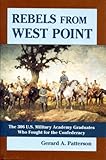Rebels from West Point : The 306 U.S. Military Academy Graduates Who Fought for the Confederacy by Gerard A. Patterson (2002) Hardcover
Select Format
Select Condition 
Book Overview
The 306 U.S. Military Academy Graduates who fought for the Confederacy
Format:Hardcover
Language:English
ISBN:0739427911
ISBN13:9780739427910
Release Date:January 2002
Publisher:Stackpole Books
Length:194 Pages
Weight:55.00 lbs.
Customer Reviews
3 ratings
A Different Perspective to a Tragic Story
Published by Thriftbooks.com User , 16 years ago
Patterson captures the in-depth details of the Civil War experiences of 306 Confederate officers who had graduated from West Point Academy. In Rebels from West Point, West Point alumni from all over the country, from the quiet Wild West to the bustling and industrious north, gather to defend their home states when they hear of the southern states' secession. Although they were trained at the expense of the northerners' tax money at the northern institution, many deserted the United States Army and joined the Confederate cause. Upon arrival, the skilled elites faced the task in front of them: training disrespectful, lazy and inexperienced clutters of men to go up against the Union army. As expected, adversities sprung up right away in this bold endeavor. The West Point alumni were initially ineffective in controlling their troops. Harshness was one of few ways to round up the drunkards as they organized themselves into respectable threats. Otherwise, the army would lead a stationary and lax life. Throughout this chaos, Patterson introduces the barrage of officers, from the threatening, yet effective, Thomas J. "Stonewall" Jackson, to the face of the Confederates, Robert E. Lee, men who represent the only chance of winning against the powerhouse Union. Documenting the intangible challenges in addition to the basic obstacles of war, Patterson reveals internal conflict among the officers, the importance of troop morale, but all while presenting these men as a band of brothers who contribute different aspects to the Confederate effort through personal stories at Shenandoah, Gettysburg, and the final surrender after the deaths of more than 20% of the Confederate West Point graduates. Offering a more personal view into the Civil War of the 1860's, Patterson emphasizes the duality of success and failures for the "small body of men" responsible for changing the Civil War into "the costliest conflict in which the nation has ever been involved." Patterson has based his portrayal on a synthesis of primary and secondary sources, as he supplements the general works used for research to manuscripts offering a firsthand account of the past. For historical facts, American history textbooks offer the complete package, but for a mixture of personal stories with facts, I approve this source as an informative, yet mostly captivating, book. The facts are concise and somewhat, but not detrimentally, condensed, which results in fast, enjoyable reading.
Nice addition to any Civil War library
Published by Thriftbooks.com User , 18 years ago
Any Civil War buff would want to add this book to their collection. Patterson mainly follows the West Point grads who served with Lee in the Army of Northern Virginia. In doing so, that kind of makes the title misleading since this only covers less than half of the 306. At any rate, though, the book is valuable in discussing the rifts that grew up between the West Point grads and the non-professinal soldiers. Further, it discusses how pre-war friendships and animosities carried over into the war years. Possibly the most interesting chapter, though, is the final chapter about the fighting amongst each other that occurred, espeically over the Gettysburg Campaign, and how non-professional soldiers actually fared better socially and economically after the war than the West Pointers. Another interesting facet of the final chapter is how some non-professional soldiers blamed the West Pointers for the Confederacy's loss, saying that the professional soldiers were too interested in their image and not the cause. Most Civil War buffs probably won't learn a whole lot of new stuff because of the book being so short, but a fast paced, interesting, well written read just the same.
Politics, war and friendships
Published by Thriftbooks.com User , 21 years ago
In Rebels from West Point, Gerard A. Patterson has compiled information on some of the more intersting figures, as well as careers, in the War Between the States. Some mention has been made in larger works, including the movie Gettysburg, about the relationships between men from both sides of the conflict, but this work covers them all, albeit in small bits sometimes.In this work, however, the conflict between West Pointers and non-professional officers is more clearly covered. From the beginning, the "newcomers" felt looked down upon by their more rigorously trained compatriots. Here, we find this attitude contributing to one of the least known aspects of the war: the professional competition among officers in both armies, and in all grades. Sometimes these attitudes took precedence over conducting the war in a professional manner.There is also some coverage of the conflicts that rose up after the war -- and particularly after the death of R.E. Lee -- over who was to blame for losing the war. James Longstreet was particularly vilified over his conduct at Gettysburg and later over his friendship with U.S. Grant and membership in the Republican Party. Such things provided fuel for men who were still trying to promote themselves, sometimes beyond their capabilities.This book is a nice addition to any collection on the Civil War and would be particularly complementary to the biographies and autobiographies which are available in abundance.






